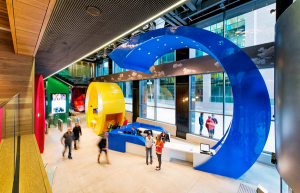 Excerpted from Francis Cholle’s The Intuitive Compass, Jossey-Bass
Excerpted from Francis Cholle’s The Intuitive Compass, Jossey-Bass
Thinking paradoxically is an exercise in setting linear and logical patterns aside for a while and opening ourselves up to the possibility that solutions and new ideas can come from places that challenge common sense. To wit, Einstein once said: “Not everything that can be counted counts and not everything that counts can be counted.” The question that follows, then, is this: what happens if a company departs from the traditional business approach, where executives focus on reason and results and where everything that count can and must be counted? Could this company still be successful with a business approach that reaches beyond conventional logic?
The best example is a company that designed the most playful and instinctual work environment we’ve probably ever known. This company is Google.
Google’s European headquarters in Zurich, Switzerland, offers a slide to take employees to a gourmet company restaurant, swing chairs hanging from the ceiling in study rooms, bathtubs to lie in and relax in front of lit fish tanks in rooms with low light, massage tables and masseurs available for employees’ breaks, and igloo-shaped meeting rooms with penguins and snow as background It looks like a kindergarten playground, not like the offices of a serious company. Yet it probably has one of the most analytical and efficient work culture if judged by the number of patents it register every year and its exceptionally high profitability. This is because Google fully embraces paradoxical business thinking.
First, let’s remember that research shows human productivity does not follow a linear continuum with time. Specifically, according to Pareto’s principle, people produce 80 percent of what really matters in approximately 20 percent of the time they spend at work. So when I hear clients complain about summer hours, coffee breaks, or employees’ short days, I always remind them of the result of the study. Timesheets for employees are a relic of the past. They made sense in the industrial era when the scientific management of labor was implemented to organize work in assembly lines. But in today’s global economy more and more companies rely on their employees’ creativity for their success. Because creativity does not follow a linear relationship with time, time management for creative employees shouldn’t either. For instance, great advertising copy can take weeks or even months to be worked and reworked to final edit, whereas, conversely, a brilliant slogan may come to mind in just a few seconds. Time spent on copywriting is not a guarantee of success. So when Google provides employees with space and resources for a break, relaxation, or a massage they actually are managing the 80/20 rule of human productivity very well. They know that at some point in the day it inevitably becomes useless to require employees to sit at their desk. Google embraces the paradox of creative time management. In my work I regularly hear executives in creative firms stating along the lines of conventional wisdom that summer Fridays off are unnecessary and counterproductive and the employees sitting at their desk all day long is their ideal representation of productivity. They do not recognize the paradoxical nature of creativity management and have a hard time thinking paradoxically when it comes to managing employees’ time.
And what about the slide to get to the restaurant? What does it do to people? What would it do to you? Do you remember the last time you went down a slide? It’s a physical experience for many of us, it’s fun, but, for others, it may feel risky. In all cases, it involves our body and therefore engages us in our guts and puts us in play mode. Simply put, it sends people to a place where they can best access their genius.
Similarly, the swing chairs get us literally off of our feet and off of the ground, and take us away from verticality, Language first developed in human beings when we moved from a horizontal position (resting on our hands and knees) to a vertical position (standing on our two feet). So when we’re sitting back in a swing chair we’re away from the axis of language, which is the instrument of logic. Therefore sitting in a swing chair takes us away from our rational mind and opens us to our imagination. Here’s the paradox: Google is extremely analytical and specific in the steps they take to engage their employees’ creativity and commitment in a playful and instinctive way. Google is probably the greatest financial success in the history of capitalism. It’s work reflecting on the face that Google handles the paradox of relying on hardcore brainpower and intellect very well while simultaneously offering headquarters that look more like a school playground than a studious and orderly library. It obviously understands something that would very likely benefit many other companies seeking higher levels of innovation. If you wish to have creative and agile employees you need to embrace paradoxical thinking, because creativity does not follow any predictable rule, but rather demands specific ingredients: flexible time management, proper play, physical engagement, and some element of random collaborations, among other things. In the same fashion, if you wish to tap into more personal creativity you need to embrace paradoxical thinking, because new ideas will not come from common assumptions.
